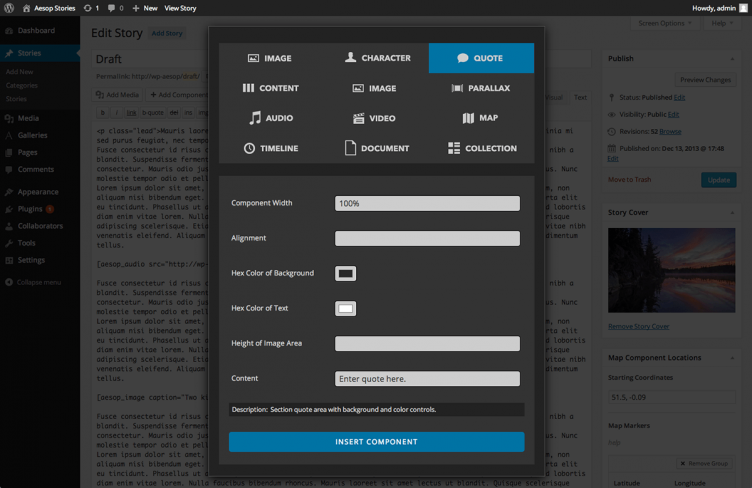 Aesop is a self-described “story engine” for WordPress. The plugin boasts “components designed for rich storytelling experiences.” Basically, it creates an admin interface that allows a site owner to create interactive stories, similar to those popularized by projects like Medium 1.0 and a number of big news agencies like The Washington Post and The New York Times.
Aesop is a self-described “story engine” for WordPress. The plugin boasts “components designed for rich storytelling experiences.” Basically, it creates an admin interface that allows a site owner to create interactive stories, similar to those popularized by projects like Medium 1.0 and a number of big news agencies like The Washington Post and The New York Times.
To get a sample from The New York Times, I’d recommend you read Invisible Child, the story of Dasani, a young homeless girl in New York City. It’s very moving.
You can also see Aesop’s introduction video here:
http://www.youtube.com/watch?feature=player_embedded&v=BndId0gvMlA
There’s also a demo page with a number of sample Aesop stories to showcase what’s possible.
Crowdfunded
Aesop has had an interesting storyline itself. Developer Nick Haskins raised just over $6,000 to create Aesop, a reduced goal from his original $15,000 target. Originally the funding was going to help pay for a hosted version of the system in addition to the free and self-hosted plugin.
He started the campaign with working demos, but it just didn’t quite take off like he hoped. However, he reduced the goal and removed the guarantee for the hosted version, and used the $6,000 to complete development of the plugin.
Version 1.0 hit the WordPress plugin repository today.
How Aesop works
Technically speaking, Aesop is pretty cool. The writing panel looks fairly intuitive, though not particularly WordPress-like.

I’m sure Nick dealt with many challenges creating a writing format to handle Aesop. I like how he’s paid attention to the weight of the code and is leaving a good bit up to WordPress themes to support Aesop.
ASE loads two files with a combined weight of about 33kb (un-compressed). The CSS file loads only the necessary core styles for the components. The rest of the styling is completely up to the WordPress theme.
Hosted Aesop
A hosted version of Aesop is also in the works for the completely non-technical writer. While skeptical, I have some confidence that there will be an audience for the .org version (even if small); but I’m quite skeptical of the viability of the hosted version.
I think the first evidence of lack of demand for the hosted version is the crowdfunding round, which failed to generate the $15,000 he was hoping for. Further, this seems directly competitive to Medium, which is extremely nice to publish on, hugely popular, well funded, and has a built in audience.
So I hope this isn’t the only way Nick plans to make money.
Can Aesop make it?
I’m interested to see how Aesop does, because to be honest, I’m a bit skeptical. It’s hard for me to nail down exactly why I’m skeptical, but I am. As Nick notes in his video, the storytelling concept is not new. However, how he’s packaging it — available to anyone within WordPress — is unique.
I think part of my concern is just what is required of a user simply to use Aesop. It’s not a hit on the product at all, but more the pure energy and effort it takes to create these compelling stories he’s built a platform for.
Creating content is hard. And I think the reason this is working for the Times, the Post, and others is because they have full time people dedicating months and months to writing these stories.
Can the regular content writer create compelling content for this format? I don’t know.
There is one marketing strategy I see that could work. Aesop reduces the barrier for smaller journalism organizations to create these stories; and there are many such organizations that don’t have full time developers on staff to build custom story designs.
Since many of these organizations are already using WordPress, Aesop could be great for them. However, I don’t know how big of an audience that is, and I don’t see evidence that Aesop is marketing to journalists and small news outlets.
Time will tell
Time will tell if Aesop will take off. I could be completely wrong about the hosted version. And I hope that Nick is able to monetize the self-hosted version with themes and support.
A year or two from now, I want to see where Aesop is. Will “storytelling” in this format be a trend of 2013 and early 2014, or will it still be going strong?

I think prominently advertising the option to use your own domain name for the hosted version would give Aesop a strong selling point over platforms like Medium, where you don’t “own your content”. I didn’t see any mention of that being available on Nick’s site, but I hope he’ll consider adding it, even if for a fee.
It’s basically simplified art directed posts. Does it offer the custom medium style commenting?
Medium is predominantly short articles and so it’s not the competition for Aesop.
Aesop is about bringing long-form storytelling in the style of the NYT to WordPress. That is big news. Not only does it truly cement WP as a CMS and not a blogging tool but it puts long-form capabilities into the hands of millions.
The issue will be that it is only a tool and that the output can only be as good as those using it. As you point out, the NYT articles work because of the combination of professionals involved.
The writing of the content, perhaps, won’t be the biggest concern. These types of stories require proper content production and that’s where skills new to a WP environment will be required.
That said, I think Aesop is a potential game changer especially for the small publishers.
Personally, I think
This is a good topic,
http://www.themevan.com/item/wonders/